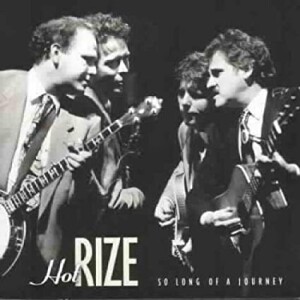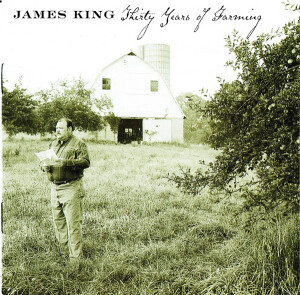 Here are two discs from very different places on the spectrum of contemporary bluegrass music.
Here are two discs from very different places on the spectrum of contemporary bluegrass music.
Hot Rize, based in Boulder, Colorado, was an innovative band capable of playing straight bluegrass with the best of the traditional bands, as well as mixing in elements of folk and jazz. Four stellar musicians made up the band: Tim O’Brien on mandolin, fiddle and lead vocals, Pete Wernick on banjo, Nick Forster on bass and the late Charles Sawtelle on guitar.
The group put out its last record in 1990 but got together for the occasional reunion tour until 1998, when Sawtelle contracted leukemia. This set was recorded in Boulder in ’96, at the end of a short but intense tour. The tapes had been misplaced until recently, but when they were found, Forster and Wernick went to work on them and produced this disc. (The band’s alter-ego, Red Knuckles and the Trailblazers, a send-up of a 1950s honkytonk band, doesn’t make an appearance on this recording.)
Wernick has gone on to a solo career, O’Brien has continued to record on his own and with his sister Molly, and Forster hosts the environmentally conscious music show “E-Town” on U.S. public radio.
The 19 tracks on So Long run from traditionals like the gospel chestnuts “Keep Your Lamp Trimmed and Burning” and “Working on a Building,” Earl Scruggs’ “Foggy Mtn. Breakdown” and Opry star Kirk McGee’s “Blue Night,” to the slightly more contemporary Delmore Brothers’ “Life’s Too Short” and Hazel McGee’s “Won’t You come and Sing For Me,” plus several songs written by Hot Rize members.
What an extraordinary band this was, and this CD catches them on a very good night when only Forster knew they were being recorded. Although they play like a well-oiled machine, there’s nothing mechanical about the resultant music. Much of the credit for this must go to Sawtelle, whose guitar work was unusual for a bluegrass band, combining elements of Doc Watson and Django Reinhardt and his own obviously quirky personality.
Some of my favorites here are the thrilling instrumental “Empty Pocket Blues,” the slow, soulful “A Voice on the Wind,” “Climbing Up a Mountain,” and the classic kiss-off song, “Life’s Too Short.” A couple of numbers, Sawtelle’s “The Butcher’s Dog” and “Colleen Malone” show bluegrass’s Irish roots.
Longtime fans of Hot Rize are sure to love this excellent live recording of a hot band on a good night, and it’s also sure to make them some new fans.
(Sugar Hill, 2002)
 James King’s Thirty Years of Farming is a solid bluegrass record in the traditional vein. This is pure country music, straight, sincere and 100 percent irony-free. Virginia native and ex-Marine King has a million-dollar voice and makes the kind of honest, heartfelt music that will be carrying on American musical traditions long after the latest fad has faded away.
James King’s Thirty Years of Farming is a solid bluegrass record in the traditional vein. This is pure country music, straight, sincere and 100 percent irony-free. Virginia native and ex-Marine King has a million-dollar voice and makes the kind of honest, heartfelt music that will be carrying on American musical traditions long after the latest fad has faded away.
For anyone who thinks bluegrass is nothing but rapid picking and high-lonesome wailing, King and his band are a refreshing change of pace. The 13 songs on *Thirty Years* run the gamut from slow ballads and weepy love songs to swinging honky-tonk and yes, some fast bluegrass. But this recording is about the songs, which are lovingly presented, rather than instrumental prowess or vocal histrionics.
King and band play some traditional bluegrass like “Toil, Tears and Trouble” and “A Faded Rose, a Broken Heart,” as well as a couple of George Jones numbers, “Flame in My Heart” and “Color of the Blues,” and Tom T. Hall’s “I Don’t See What I Once Saw.” The title tune was penned by Canadian folkie Fred Eaglesmith.
King’ husky, pleasant baritone is perfectly set off by the high harmony of Kavin Prater. Owen Saunders’ fiddling, which ranges from sweet and bluesy to fast and furious, is always right on the mark, as is the picking of Adam Poindexter on banjo. Prater on mandolin and Joe Clark on bass set the rhythm, although Clark, a new band member, sometimes seems to get out in front of the beat.
King gives each song 100 percent, but never oversells it. Songs like the album-ending “Play Us a Waltz,” about nursing home residents, are packed with emotion — “It’s the worst kind of prison/and there ain’t no parole.” But King’s straightforward presentation, while it doesn’t shy from sentiment, doesn’t wallow in sentimentality.
If you already like bluegrass, or your interest has been piqued by the current revival of old-time American music, check out James King for a look at contemporary bluegrass that respects the music’s traditions.
(Rounder, 2002)
